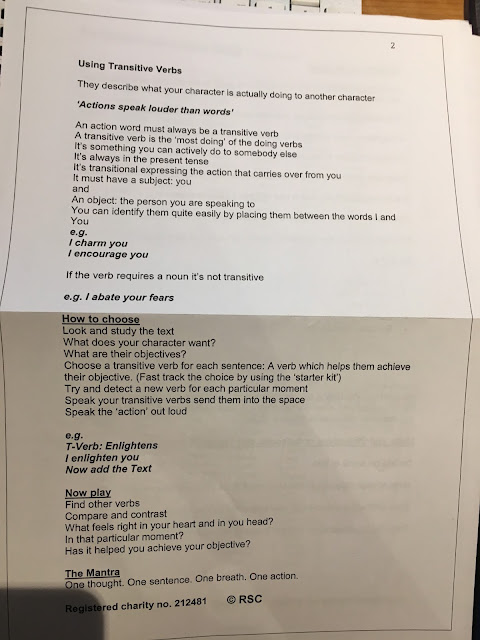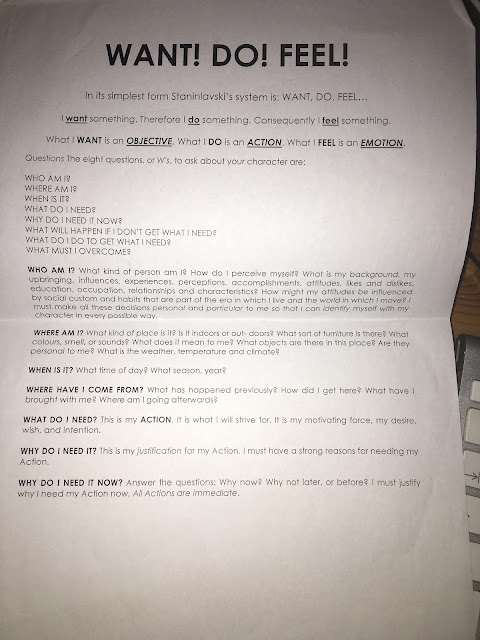Lesson 3 - 20.9.16
To start the lesson we did a relaxation exercise with a partner. One of us had to lay in semi supine whilst the other started to massage the others arms, hands, legs, feet, neck and head. This was just a small exercise to help get nice and relaxed before we get into character.
We then had to get into our partners that we are with for our performance of The Seagull extract. We were instructed to talk about the major events that happen in the scene and make sure we knew what they were. After that, we had to improvise that scene, off script, and with modern language. This helped me to understand the scene and the characters feelings towards each other much better. This is because there wasn't a barrier to me fully understanding as I could carry out the scene in my own language. For example, I could understand how Konstantin really felt about Trigorin as I was free to convey my emotions in a modern setting. As an actor, simple exercises like this can really help improve understanding of a scene.
Afterwards, we then had to look at the script of the extract and divide it into units. "U
nits of action, otherwise known as bits (or beats), are sections that a play's action can be divided into for the purposes of dramatic exploration in rehearsal." We needed to split our script into units, every time there was a thought change, and write our character's objective for that particular unit. Here is a picture of my script that marks out where I decided to put the units:
Here are my descriptions of each of my Units my character's objective:
UNIT 1
A unit in which Konstantin is overwhelmed by Nina's sudden entrance but is also pleased. He has seen Nina for the first time in a very long time.
Objective: To greet Nina
UNIT 2
A unit in which Konstantin is slightly naive about people coming through the door although Nina is paranoid.
Objective: To reassure Nina
UNIT 3
A unit in which Nina starts to ask Konstantin questions. He tries to flatter and woo her with his feelings.
Objective: To flatter Nina
UNIT 4
d A unit in which Konstantin lets out his anger towards Nina. He questions Nina on why she didn't visit. He tells of his torment and loneliness.
Objective: To get Nina to understand his pains
UNIT 5
A unit in which Nina goes slightly mad. Her speech is fragmented and she begins to lose her train of thought quite a few times. She tries to explain but doesn't succeed.
Objective: To try and understand Nina's torment.
UNIT 6
A unit in which Konstantin professes his everlasting love for Nina. Nina is dismayed and tries to leave swiftly.
Objective: To get Nina to stay
UNIT 7
A unit in which Nina is paranoid about Arkadina intruding. Konstantin seems to answer reluctantly.
Objective: To not let Nina change the subject
UNIT 8
A unit in which Nina questions Konstantin on why he loves her and he slowly starts to let her go.
Objective: Reluctantly let Nina go
CHARACTER PROFILING
After this we then got on to rehearsing our extracts. At first I found it quite difficult to get into the character of Konstantin as he is quite complex, psychologically and emotionally because of all of the stuff he goes through prior to this scene. From research that I've done, Konstantin is aged at "twenty-something." So physically, I didn't think I needed to alter my physicality much. However as I ran the scene I felt it wasn't right and that because of all the emotional torment he is put through, ending in his suicide, that he may have the physicality of someone who considerably older than him. Also, in the script he says "I feel I've been living on this world for ninety years." which is proof that not only he looks older, he also feels it.
I did some more WANT! DO! FEEL! work on my character as well.
WHO? - Konstantin Treplev
WHEN? - 1896
WHERE? - Family estate, Russia.
WHY? - To get away from family so I can write in peace. Also to get Nina to stay in this particular scene.
FOR WHAT REASON? - Because he feels everything he writes is not good enough. He loves Nina and wants to be with her.
HOW? - By trying to explain his feelings to her.












